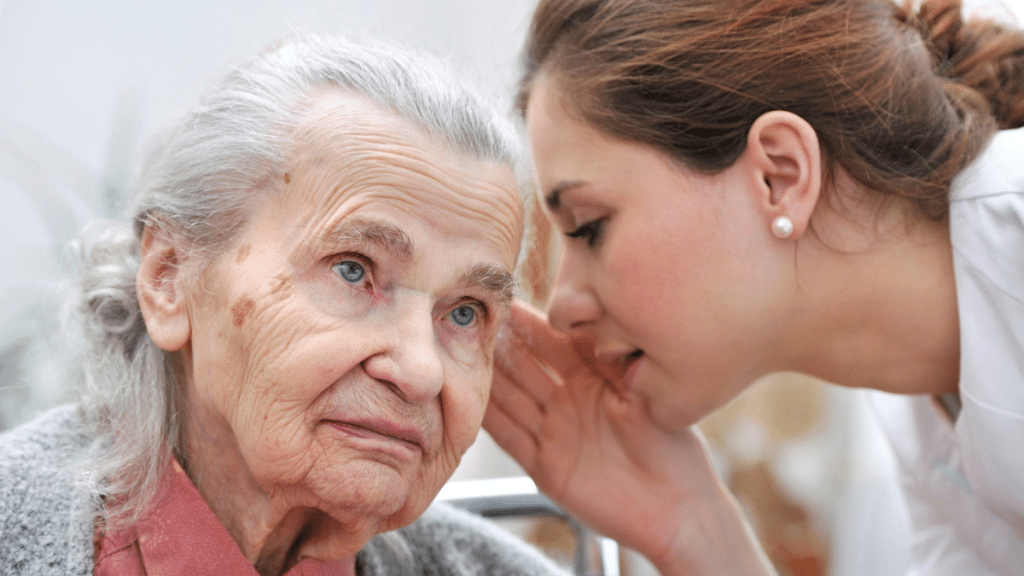Most of us expect our eyesight to change with age, but what about our hearing? There’s a common belief that hearing loss is simply part of getting older, something we’ll all have to deal with eventually. But is that actually true? While it’s certainly more common in older adults, hearing loss isn’t guaranteed and isn’t always caused by age alone. Let’s explore what really causes hearing loss, when it typically starts, and what you can do to protect your hearing for the long haul.
Understanding Age-Related Hearing Loss (Presbycusis)
Age-related hearing loss — also known as presbycusis — is one of the most common conditions affecting older adults. It usually develops slowly over time, often starting in your 60s or 70s, although some may notice changes earlier. Presbycusis is typically caused by gradual changes in the inner ear or auditory nerve, making it harder to hear high-pitched sounds or follow conversations in noisy places.
Because it’s so gradual, many people don’t realise it’s happening until it starts to affect their daily life. You might find yourself turning the TV up more than usual, asking people to repeat themselves, or avoiding noisy social situations without quite knowing why. When do you need to wear hearing aids? Click on the link to find out.
Is Hearing Loss Inevitable With Age?
While hearing loss becomes more likely as you get older, it’s not necessarily inevitable. Research shows that roughly one in three people over 65 experience hearing loss, but that still means many don’t. Genetics play a role, as do environmental and lifestyle factors — including how much noise exposure you’ve had throughout your life.
Put simply, ageing increases your risk, but doesn’t seal your fate. Think of it like grey hair: common, but not universal. Some people in their 70s have excellent hearing, while others might notice a decline in their 40s due to other causes.
Other Causes of Hearing Loss at Any Age
Hearing loss isn’t exclusive to older adults. Plenty of younger people experience hearing problems due to other factors, and it’s important to know what these are:
- Noise exposure: Regularly being around loud noises — like concerts, clubs, or construction work — can damage your hearing over time.
- Medical conditions: Diabetes, high blood pressure, and certain autoimmune diseases can affect hearing health.
- Infections or injuries: Ear infections, head trauma, or untreated illnesses can lead to permanent damage.
- Medications: Some medications, especially chemotherapy drugs and certain antibiotics, can be ototoxic, meaning they harm the inner ear.
Knowing these risks means you can take steps to protect your hearing, no matter your age.
Early Warning Signs to Watch For
Hearing loss often creeps in slowly. Here are some red flags that you (or someone you care about) might be experiencing early signs:
- Struggling to hear in crowded or noisy places.
- Frequently asking people to speak up or repeat themselves.
- Turning the volume up higher than others prefer.
- Noticing that voices sound muffled or unclear.
- Hearing ringing or buzzing in the ears (tinnitus).
If any of these sound familiar, it might be time to get your hearing checked — even if you think you’re “too young” for it.
How to Calm Your Nerves Ahead of a Hearing Test
Are you nervous about going to your first hearing test? Whether you’re experiencing changes with your hearing or you just want to make sure everything is good for your age, you can feel anxious about going to the appointment. In fact, some people get so worried that they delay the hearing test and don’t attend. Thankfully, there are some things you can do to make sure that you’re calm and collected for the appointment.
Understand the Process
First, you should educate yourself on what hearing tests involve. Often, you can feel nervous about something because you don’t know what it entails. Thankfully, there’s a lot of information online about hearing tests and what you can expect. For example, you’ll often have a discussion with the professional first. Then, they will play sounds that you have to listen to. It’s not an invasive process and often, it’s shorter than you think.
Plan Your Day
It can help if you feel like you have control over the situation. Plan your day around the appointment so that you can know what’s happening. For example, you could plan what you’re having for breakfast, what you’re going to do afterwards and what time you’ll head to the appointment. Knowing what you’re doing can allow you to avoid rushing and other anxieties from not being prepared.
Bring a Friend
Know that you don’t have to go alone to a hearing test. If you’re feeling very nervous and a loved one could help you, don’t hesitate to bring them along. This can allow you to feel more relaxed, which means that you can do your best on the hearing tests.
Conclusion
So, is hearing loss just a part of getting older? Not quite. While ageing increases the likelihood, it doesn’t make it a certainty. Your lifestyle, environment, and overall health play a big role in how well your ears age. The good news? There’s plenty you can do to protect your hearing — and if you do start to notice changes, early action makes a world of difference.
Don’t wait until it becomes a struggle. Get your hearing checked, take care of your ears, and enjoy the sounds of life — no matter your age.
